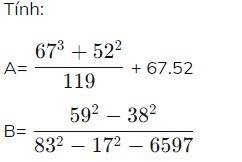Giải bài toán sau :
Sân nhà bạn An là hình chữ nhật có chu vi là 30m và chiều rộng 5m.
a. Tính diện tích sân nhà bạn An.
b. Bố An muốn dùng những viên gạch hình vuông cạnh là 50cm để lát sân. Vậy bố An cần dùng bao nhiêu viên gạch để lát hết sân đó ?
Cần câu trl gấp ạ!


a) Nửa chu vi là :
30:2=15(m)
Chiều dài sân là :
15-5=10(m)
Diện tích sân là :
10x5=50\(\left(m^2\right)\)
b) Diện tích 1 viên gạch là :
50x50=2500\(\left(cm^2\right)\)=0,25\(\left(m^2\right)\)
Cần dùng số viên gạch để lát sân là :
50:0,25=200(viên gạch)
Nửa chu vi là :
30:2=15(m)
Chiều dài sân là :
15-5=10(m)
Diện tích sân là :
10x5=50(�2)(m2)
b) Diện tích 1 viên gạch là :
50x50=2500(��2)(cm2)=0,25(�2)(m2)
Cần dùng số viên gạch để lát sân là :
50:0,25=200(viên gạch)